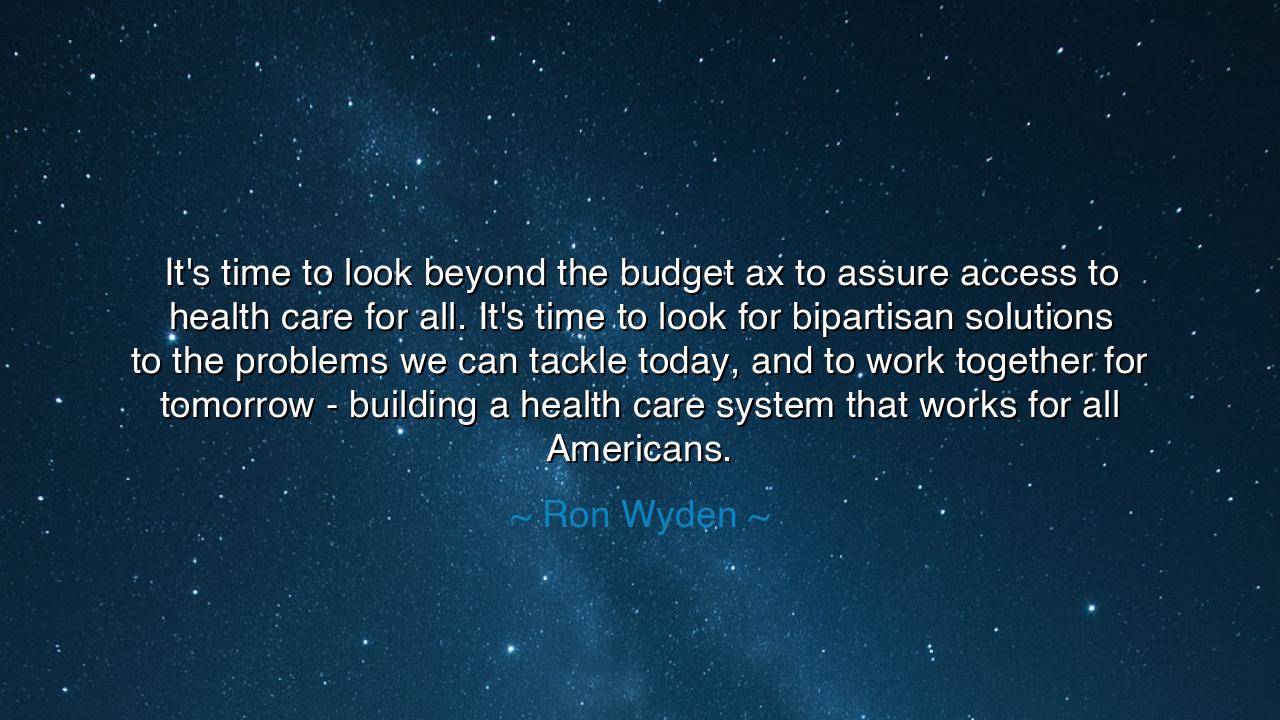
It's time to look beyond the budget ax to assure access to health
It's time to look beyond the budget ax to assure access to health care for all. It's time to look for bipartisan solutions to the problems we can tackle today, and to work together for tomorrow - building a health care system that works for all Americans.






In the measured and visionary words of Ron Wyden, a truth is spoken that belongs not only to politics but to the very heart of civilization: “It’s time to look beyond the budget ax to assure access to health care for all. It’s time to look for bipartisan solutions to the problems we can tackle today, and to work together for tomorrow — building a health care system that works for all Americans.” These words, though uttered in the halls of Congress, carry the spirit of the ancients — the call for balance, unity, and justice in the governance of the people. They remind us that progress does not spring from division or destruction, but from collaboration, compassion, and courage.
Wyden, a senator known for his work on health reform and his belief in consensus over conflict, spoke these words amid a climate of sharp political division. The “budget ax” he refers to is not merely the cutting of numbers, but the mentality of reduction — the impulse to solve complex human problems through austerity alone. His wisdom lies in seeing beyond this. For health is not a ledger to be balanced; it is the lifeblood of a nation. To deny care is to diminish the people; to build systems of access is to strengthen the very foundation of society. His words are an invocation — a call to remember that policy is not about profit, but about people.
The ancients would have understood this deeply. Solon of Athens, when reforming his city’s laws, knew that a state survives only when justice is extended to all. In the same way, Wyden’s call to “look for bipartisan solutions” echoes the timeless truth that unity is strength. A divided government, like a divided people, cannot heal itself. Just as the body requires harmony between its organs, so too does a nation require cooperation among its leaders. Wyden’s voice, calm yet insistent, reminds us that healing — whether of a body or a country — demands empathy and collective will.
The heart of his message lies in the phrase “work together for tomorrow.” This is the essence of statesmanship — to plant seeds of reform whose fruits may be harvested by generations yet unborn. It is easy to destroy; it is harder to build. The budget ax cuts swiftly, but construction requires patience, humility, and vision. The health care system, he says, must be built to serve all Americans — not the privileged few. In this, Wyden joins the lineage of leaders like Franklin D. Roosevelt, who during the Great Depression spoke not of numbers but of the dignity of every person, declaring that “necessitous men are not free men.”
Consider the story of Florence Nightingale, who during the Crimean War saw suffering where others saw statistics. Against bureaucracy and indifference, she brought light — both literal and moral — to the darkness of neglect. She did not wield a budget ax; she wielded compassion, efficiency, and an unrelenting belief that care should be humane and universal. Her work transformed medicine not through power or politics, but through the harmony of reason and empathy. So too does Wyden call for that same blend — to unite practicality with morality, to temper logic with love.
The lesson of his words is clear: the future must be built, not cut. Nations cannot advance by shrinking their sense of duty. The true measure of strength is not the size of the treasury, but the wellbeing of the people it serves. Every act of cooperation, every bridge built between opposing sides, is a triumph over cynicism. To work together — even when divided by belief — is to honor the greater good.
Let this, then, be the teaching carried forward: do not seek destruction where creation is possible; do not wield the ax where healing hands are needed. In our homes, our communities, and our nations, look beyond self-interest and party, and labor for what uplifts all. The bipartisan spirit Wyden evokes is not mere politics — it is the ancient art of peace, the discipline of listening, the humility to serve rather than to conquer. For only when we choose cooperation over conflict can we build, as he says, a system — and indeed a world — that works for all.
Thus, remember: the true builder is not the one who divides resources, but the one who multiplies hope. When you see the “budget ax” raised — in government, in life, or within your own heart — pause, and ask instead: what can I build here? What can I heal? What can I join together? For in answering that question, you become not just a citizen of your nation, but a guardian of its spirit — one who, like Wyden, sees beyond the present cut to the promise of a better tomorrow.






AAdministratorAdministrator
Welcome, honored guests. Please leave a comment, we will respond soon